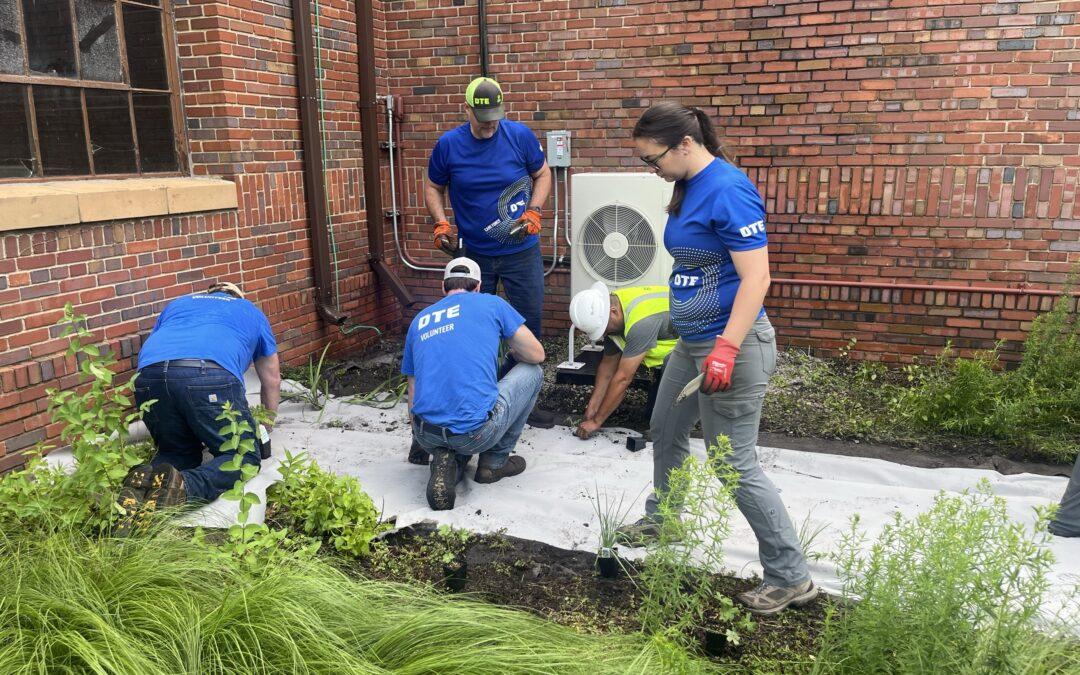When it comes to powering our world, few things contribute as much as pollinators do. Bees, birds, beetles and others help between 75% and 95% of all flowering plants on earth reproduce and their work makes one out of every three bites of food we take possible.
That’s why DTE Energy works hard to support these amazing animals at more than two dozen pollinator gardens across our properties in Michigan and why we wanted to do our part for them during Pollinator Week.
Started by the organization Pollinator Partnership, Pollinator Week is an annual celebration of pollinator health that takes place every June. This year, DTE celebrated these critters by updating the garden at the Ann Arbor Service Center and teaching children at the Boll Family YMCA in Detroit about why supporting pollinators is so important.

The team kicked off the week with a planting at the Ann Arbor Service Center. Volunteers came out bright and early to clear unwanted growth from the existing garden and add a variety of plants that support pollinators all year round. This Wildlife Habitat Council certified garden supports everything from ants to bees to butterflies while also filtering water along the banks of the Huron River.
“Having species of plants that have overlapping bloom times provides food sources throughout the year,” said Kristen LeForce, a DTE environmental engineer who planned the additions to the garden.
Plants like Wild Geranium and Bloodroot are early spring wildflowers and provide food in the form of nectar in the beginning of the year when the first bees and butterflies start to emerge from the winter. Milkweed is the host plant for the Monarch butterfly, meaning that it is the only plant species that their larvae is laid on and the only thing the caterpillars eat. It is essential to the life cycle of the Monarch butterfly and integral to their species’ survival. The other plants installed bloom throughout the rest of the year, continuing to provide food for butterflies and other pollinators throughout the growing season.

Children at the Boll Family YMCA summer camp color pollinator masks.
Later in the week, volunteers educated children at the Boll Family YMCA summer camp in Detroit. The team led about 30 campers through a game called Monarch Migration that shares the struggles butterflies face when traveling across the continent, taught them about the role pollinators play in our ecosystem and shared how they can support these important animals in their communities.
“It was so wonderful to see so many happy excited faces, ready to play and pretend to be something so tiny with such a big environmental impact!” said volunteer Cassie Lutz, a student co-op at DTE. “I loved how many campers were so eager to answer and ask questions about who and what pollinators are.”

Summer campers with the Boll Family YMCA play Monarch Migration with a DTE volunteer.
The children also colored pollinator masks and even took home seed packets to plant so they could help bees and butterflies in their own backyards.
With these efforts, the DTE team was proud to support pollinators, while encouraging their importance to the next generation, too. Because, while these animals may be small, their impact is huge.
“It is great for companies to be involved in their communities because it can inspire others to consider their environmental impact,” Lutz said. “It shows responsibility and care for the environment that nourishes us. It would be an incredible thing if even one camper left the event today inspired and wanting to learn more about pollinators and their importance. Someday that passion could make a difference and contribute to a healthier planet.”
